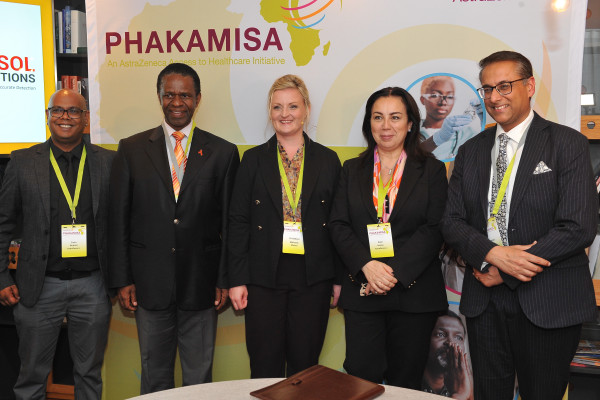In a boost to South Africa’s healthcare resilience, the first Phakamisa Sustainability and Innovation Summit has paved the way for more effective, efficient, and equitable delivery of high-quality healthcare across the country.
Hosted at the Embassy of Sweden, the first-of-its-kind summit focussed on prevention and early detection, capacity building and health equity, and optimising the use of innovation to build sustainable healthcare systems. The Summit delved into issues of growing concern, including noncommunicable diseases such as cancer, diabetes, and heart disease, which have increased dramatically in South Africa in recent decades. [1] Pre-eminent speakers came from across the healthcare ecosystem, including Deputy Minister of Health, Dr Sibongiseni Dhlomo, as well as representatives from businesses, patient groups, non-governmental organisations, and the United Nations.
To kick off the event, global pharmaceutical company AstraZeneca signed a partnership agreement with Rare Diseases South Africa, supporting the creation of a national registry for rare diseases and providing training and help for young patients and caregivers aged 18-30 affected by rare diseases. 1 in 15 South Africans is estimated to be affected by rare diseases, the collective name for more than 7,000 different conditions. The partnership will increase understanding of the burden of rare diseases in South Africa and improve equitable health care for those affected.
In addition, AstraZeneca also announced an expansion of its existing collaboration with Medsol AI Solutions, which deploys state-of-the-art Wi-Fi ultrasound probes to detect lesions at high risk of breast cancer in seconds. The AI (Artificial Intelligence) rapid detection app has already been rolled out in rural Melusi and Daspoort Poli Clinics in Tshwane to help with early disease detection. It will now be expanded to breast cancer screening programs at Tintswalo Breast Health Clinic, Groote Schuur Hospital Breast Clinic and Quadcare Clinic in Alexandra.
Pelin Incesu, Area Vice President, Middle East and Africa, AstraZeneca, stated, “In partnership with the government and other stakeholders, AstraZeneca is working tirelessly to strengthen South Africa’s healthcare system by focusing on providing equitable access to care and medicines and exploring innovative technology that can detect disease at an earlier stage, improving patient outcomes. The Phakamisa Sustainability and Innovation Summit provides a platform to collectively explore new ways to prevent emerging threats to health like non-communicable diseases, to diagnose patients earlier and quicker, and to ensure all healthcare practitioners have the skills to deliver top-quality care to patients, no matter who they are or where they live.”
Dr Sibongiseni Dhlomo, Deputy Minister of Health, Republic of South Africa, said, “We are committed to delivering quality healthcare services for all South Africans, and that means working with partners across the public, private and third sector to ensure our health system is sustainable and resilient, able to meet current and future challenges. With non-communicable diseases rising, prevention, early detection, and capacity building are at the forefront of these efforts.”
Kelly Du Plessis, Rare Disease South Africa added, “These agreements are the next step in our mission to create a better tomorrow for the millions of South Africans who have been or will be, diagnosed with a rare disease or congenital disorder in their lifetime. The Phakamisa Sustainability and Innovation Summit is a fitting occasion to announce these partnerships, as improving care for those with rare diseases will help to strengthen our entire health system.”
[1] Republic of South Africa, Department of Statistics: https://apo-opa.co/47kDNCI. (Accessed November 2023)
Distributed by APO Group on behalf of AstraZeneca.
For media enquiries, please contact mediamea@astrazeneca.com
About Phakamisa:
Phakamisa is AstraZeneca’s access to healthcare initiative in South Africa. Now in its 11th year, Phakamisa, which means “upliftment”, brings together different organisations and is helping to reduce the burden of non-communicable disease including breast cancer, prostate cancer, and lung cancer. The programme has reached over 1.63 million people through outreach activities led by community healthcare workers with over 19 700 women identified with breast issues (https://www.MyPhakamisa.com/).
About AstraZeneca:
AstraZeneca (LSE/STO/Nasdaq: AZN) is a global, science-led biopharmaceutical company that focuses on the discovery, development, and commercialisation of prescription medicines in Oncology, Rare Diseases, and BioPharmaceuticals, including Cardiovascular, Renal&Metabolism, and Respiratory&Immunology. Based in Cambridge, UK, AstraZeneca operates in over 100 countries, and its innovative medicines are used by millions of patients worldwide. Please visit Astrazeneca.com and follow the Company on Twitter (https://apo-opa.co/3QOeunc).
